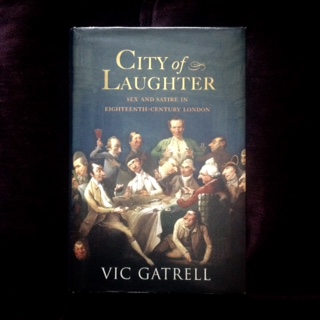Inspiring Older Readers
 posted on 22 Jun 2021
posted on 22 Jun 2021
City of Laughter: Sex and Satire in 18th Century London by Vic Gatrell
This book by history professor, Vic Gatrell is a heavy-weight proposition in every sense. It’s a masterpiece of dogged scholarship, dauntingly detailed and (the hardback at least) weighs a ton in the hand. The latter quality isn’t just because of its five hundred pages but because it uses a beautiful art paper that facilitates the very best reproductions of the fabulous satirical prints from the likes of Gillray and Cruikshank that are held by the British Library.
Gatrell’s starting point is to set out his basic principle – that for these popular Georgian prints to be successful requires those who buy them to be keen on a bit of scurrilous gossip, a good lump of smutty fun, a willingness to mock those in positions of power and influence and a strong stomach for the gratuitously scatological. All of this, he points out, sits in stark contrast to the popular perception that Augustan England at the end of the 17th century was dominated by rather stern, moralising didacts, using satire to lay bare the foibles of a decadent humanity.
What makes this book so much fun however is Gatrell’s determination to uncover the real lives, loves and absurdities of the population. The attitudes of the 18th century citizen of London are so significant because without understanding the society that produced Gillray or Rowlandson, it is impossible to really understand the nature of the satirical cartoonist and what they were trying to do. So here we get to see how the content of the satires is not only driven by higher political debate but by misogyny, a willingness to mock a small elite, xenophobia, fashion and a real relish for bodily functions and sex. All of these become a giant soup that when mixed together create a ‘city of laughter’ rather than a city of censoriousness.
Reviewing the book on its release back in 2006, Katheryn Hughes writing for The Guardian, put it this way:
“Mocking the great men and the even greater women of the day (bolster breasts and ham-like buttocks always raised an extra titter), these prints went straight to the most pressing public matters - the loss of America, the war with France and corruption, corruption, corruption. These were the dark and difficult matters that underlay the apparently jovial pantomime of fat ladies' bottoms and politicians too pissed to stand.”
It seems to me that Gatrell rather admires the almost lawless world of London that is documented by the great satirists. There is a real brio in the way he talks about the licentiousness of the population, the fashions of the women that move increasingly to the kind of topless display that wouldn’t reappear again until the 1960s. When he is forced to also write about the decline of this colourful culture in a chapter he entitles ‘The Age of Cant’, you can almost feel his shoulders drop a little.
This is a wonderful book for anyone who, like me, has been beguiled by the 18th century because you’ll find a very different world here – smelly and fixated on bodily functions of the sort Swift or Pope would have tutted about, but one that is full of life and real vim.
Despite its length and weight, this is a really eminently readable book and made so by Gatrell’s prose style, which is unfussy and unaffected. This is a quality also noticed by Piers Brendon writing for The Independent in 2011:
“Gatrell's prose is an idiosyncratic mixture of demotic and didactic; it's pertinent rather than elegant, giving the impression that he is thinking aloud. His penetration becomes obvious once you try to interpret the prints without his commentary.”
This is definitely a book you can return to time and time again and you’ll find more and more to enjoy. Those of you with limper wrists will be delighted to know that they don’t have to struggle with the hardback – especially in bed – because a paperback is also available and considerably more manageable. But if you’re an aficionado of the prints, you’ll want the hardback to struggle with.
Terry Potter
June 2021